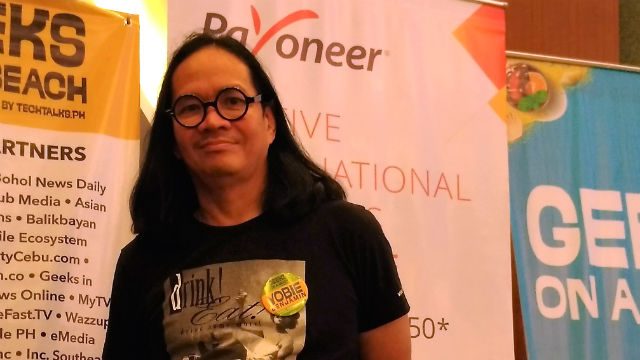SUMMARY
This is AI generated summarization, which may have errors. For context, always refer to the full article.

Filipino-American tech gurus in Silicon Valley, United States, continued to sound off alarms on the impact of artificial intelligence (AI) on the Philippines’ cash cow, the business process outsourcing (BPO) industry.
The latest to give his expert take is Antonio “Yobie” Benjamin, one of the pioneers among Filipinos in Silicon Valley who parlayed their digital geekery into money-making startup machines. Benjamin, 58, formerly of Malabon City, Metro Manila, is chief technology officer (CTO) of clickSWITCH and Emeritus CTO of Token.io – two finance-oriented startups among many other tech and entrepreneurship engagements.
Benjamin was in the country for the 5th Geeks on a Beach (GOAB) 2017 international conference and startup competition on August 24 and 25 in Puerto Princesa City, Palawan, on the invitation of TechTalks.ph to share his experiences and the story of his success in Silicon Valley.
On the sidelines, Benjamin also shared his thoughts on the effects of AI on the value of human work, a pressing concern given the speed at which AI is developing and the fact that 1.2 million Filipinos are in the AI-vulnerable BPO industry.
AI and work
First, a short backgrounder from Martin Ford, futurist, Silicon Valley entrepreneur, and author of a book titled Rise of the Robots: Technology and the Threat of a Jobless Future in which he warned of the disruption that technology will wrought on the job world.
Ford, in one interview, asserted that today’s world is a different world “because machines are now starting to think. Artificial Intelligence (AI) is getting cognitive powers – something completely different than computers performing computing tasks.”
While human capabilities still put people ahead of computers, the separation is getting smaller, he pointed out. And it might come sooner rather than later. Ford said the major disruption in the labor market could occur in 10 to 20 years, saying he is being conservative with that estimate. “In Silicon Valley, many people think it will happen in five to 10 years.”
Benjamin, when informed of this, nodded.
“Yes, I agree absolutely, probably sooner,” the Filipino-American said.
So, what is his advice to the Philippine government, given the warnings issued by tech experts on the impact of AI on the BPO industry?
Benjamin said that, first of all, the government must continue improving the country’s internet infrastructure, and make it a national priority.
He held his smartphone and asked Siri, Apple’s voice-activated personal virtual assistant that came out on iOS in October 2011 with the iPhone 4S.
“Hey, Siri, where is Palawan?”
“I am having some trouble with the connection. Please try again in a moment,” Siri answered.
Benjamin said that Siri’s reply is an example. “So, how can you create jobs in Palawan when you can’t connect people? So, that’s means when you see that, even [if there is] a call center [company] here in Palawan, they can’t work, even if they have good English skills if they can’t connect.”
Training knowledge workers
“Second thing is that we need to move the levels of service that we provide through the BPO industry, to more of what they call knowledge workers [with] higher knowledge,” he said.
“Say, instead of a ‘How do I turn this computer on? Did you plug it in? Or did you use the right button?’ very low level support job, I think we should go and prepare our workforce to be able to handle higher level, knowledge-worker-type-jobs because the competition is not going to be who can provide the cheapest service anymore, but it is going to be a lot of it is going to be driven by artificial intelligence.”
What he was trying to drive at, he explained, is the coming years will be very knowledge worker-driven. “What I mean is that these phones and computers will not [be] the same, [and] it is going to be a very different labor market.” The Filipinos workforce’s ability must be scaled up and moved up the chain; people here must have know-how with how best to integrate with AI systems, knowledge-based systems, or machine learning systems.
That also means upgrading the education. “We have a lot of college graduates that are not, quite frankly, prepared for the next 10 years,” he said.
The tech guru from Silicon Valley emphasized that this situation is not only going to be true with the Philippines, but also with the U.S. “You know, even fast food jobs are going to be taken over by robots. So, no more McDonald’s servers. Think of Jollibee with no people. Think of drivers who drive jeepneys in Manila; no more, no more drivers.”
“So, what do you do as a matter of national policy to prepare for a workforce that requires very different skills and you are part of a global economy? You have to prepare for the future. The future is not very far.” Benjamin said.
One other advantage that humans still currently have over AI? Creativity, Benjamin said. “If it’s a decision that’s based on information, computers can do it. But go and ask a computer to create a fine art piece, I don’t think that computer knows how to do that.” At least not yet. – Rappler.com
Add a comment
How does this make you feel?
There are no comments yet. Add your comment to start the conversation.